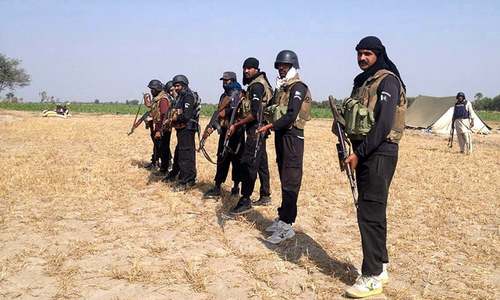Following Chief of Army Staff General Raheel Sharif’s call for across-the-board accountability, the complex civil-military relationship is in the spotlight once again.
The well-timed dismissal of six army officers – including one Lt-General and a Major-General – on charges of corruption, is being seen by many defence and political analysts as a move directed at pressuring the civilian side to act.
The military’s checkmate move came after the release of the Panama Papers, which revealed that the prime minister’s three children – two sons and a daughter — own offshore companies in the British Virgin Islands.
Following the political storm that erupted once news of the offshore companies became public, the army chief’s statement calling for across-the-board accountability is said to have strained ties between the civil and military establishments. No longer was it possible for anyone to claim that both sides had reached an understanding of sorts to not interfere in each other’s domains.
Examine: Democratic corruption
Officials claim that the leaks have put GHQ at an advantage.
For a senior PML-N lawmaker, who claims to be part of the ruling party’s inner sanctum, “at no point in time [since 2013] can one say that the prime minister and army chief developed an ideal relationship.”
Considering PM Sharif’s past experience with the military and his decision to try General Pervez Musharraf under Article 6, “the two sides naturally tend to be skeptical of each other and this is how it has been for the past three years,” the lawmaker said.
In fact, he argued that certain developments over the past year or so have only added to apprehensions on both sides. For example, the PML-N legislator explained, the military establishment wasn’t happy with the civilian’s handling of the China Pakistan Economic Corridor (CPEC).
Reportedly, the military establishment suggested setting up an authority to oversee projects being carried out under CPEC, since a lack of political consensus continued to mar its progress. It suggested that a full-time authority will help all the stakeholders, particularly the provincial governments, to provide regular input.
A senior security official confirmed that the army leadership wanted an arrangement to smoothly address CPEC-related concerns. It’s worth noting that in an unprecedented move, the Chinese embassy in January this year, through a press statement, called upon the political leadership of the country to resolve its differences over CPEC.
The civilian government has so far ignored the idea. The prime minister has set up the special Prime Minister’s Delivery Unit (PMDU) to monitor CPEC. Established in April last year, the Ahsan Iqbal-led Planning Commission was initially its line ministry. However, Maryam Nawaz Sharif later took it upon herself to supervise the unit.
Such skirmishes, which take place away from the public arena, are not infrequent.
For example, in February, the military tried to push retired Lt-Gen Mohammad Alam Khattak for the position of KP governor. However, the government preferred a party loyalist and appointed Iqbal Zafar Jhagra.
This, perhaps, was not as serious an issue as the two sides’ disagreements over the operation in Punjab.
Since January this year, reports have been coming in thick and fast about the army’s assessment that Rangers should be deployed in the southern districts of Punjab since the Punjab police was ill-equipped to deal with the security challenges there.
In fact, more than once, the provincial apex committee formed under the National Action Plan (NAP) had detailed discussions on the issue. However, the PML-N led Punjab government was averse to the military’s deployment and argued that provincial law enforcement agencies could handle the threat.
However, the provincial government had to yield after the tragic Gulshan-i-Iqbal suicide attack, which resulted in more than 70 deaths in March. Shortly after the attack, the military leadership simply took the unilateral decision to launch a province-wide operation. If there were still any civilian claims about its law enforcement capacity, these were laid to rest with the fiasco in Rajanpur.
The army had to be called in once a police operation ended with the death of a dozen policemen and the kidnapping of thirty more.
However, this does not mean that the Punjab government has accepted defeat.
In fact, the province is still to give legal cover to the Rangers as has the Sindh government. The Rangers in Sindh have the powers to make arrests and investigate, whereas, in Punjab they are only assisting civilian government.
A senior security official confirmed that the Punjab government was yet to provide them legal cover. When asked, a PML-N office bearer argued that Karachi had been taken hostage by murderers and extortionists, while the problem was limited to some pockets in Punjab. “It’s unfair to draw parallels between Punjab and Sindh.”
In the midst of all this landed the Panama leaks, providing the military with another opening to land a blow or two. However, it’s not clear if it will now let the civilian government be or will continue increasing the pressure.
Published in Dawn, April 29th, 2016

















































